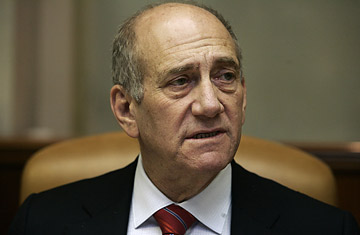
Israeli Prime Minister Ehud Olmert.
(2 of 2)
A former Jerusalem mayor and ardent soccer fan, Olmert was known primarily as the cigar-chomping back-room wheeler-dealer who followed his mentor, Ariel Sharon, out of the rightwing Likud party to create Kadima. Olmert came to power by a fluke: Sharon fell into a coma in January 2006 and Olmert, as his deputy, succeeded him as prime minister, vowing to extend Sharon's evacuation of Gaza into the evacuation of some of the hundreds of thousands of Jewish settlers in the West Bank. Says Yaron Ezrahi, a political science professor at the Hebrew University in Jerusalem, "Olmert will be known as the first leader who realized that the settlements place an intolerable burden on Israeli society and yet was unable to act on this."
Over the past two-and-a-half years, not a single Jewish settlement has been removed from the Palestinian territories, despite intense pressure from the U.S. and the international community on Olmert. Today, with one foot out the door, Olmert sounds repentant that he did not try harder. As he told his cabinet: "Every day that goes by without our reaching a deal with the Palestinians is a day we may regret in the future, and I say this as a man who once had, and fought for very different ideas." He added: "If we don't reach a deal fast we'll be missing an opportunity, and missing that opportunity may come at an unbearable price."
Such sober talk coming on the eve of his departure has some analysts wondering whether Olmert may try to remove some of the smaller outposts from the West Bank during his tenure as caretaker prime minister. "He might choose to act like Samson pulling down the pillars of the temple," says Ezrahi. Evidence that Olmert might be thinking this way: During the Sunday cabinet meeting, a bill was proposed offering settlers 1.1 million shekels ($308,000) if they were willing to relocate back inside Israel. Many settlers might take the cash offer, Olmert's aides believe.
But Olmert could only pull off such a bold maneuver if he is able to extend the tenure of a caretaker government for several months. The idea is not so far-fetched, in light of the battle for leadership of Kadima now underway between Foreign Minister Tzipi Livni and Transportation Minister Shaul Mofaz. The party primary could easily drag into a second round of voting. Even once a new Kadima leader is chosen, it may take several months of horse-trading with Israel's myriad parties to cobble together a new ruling coalition. Olmert may yet find the time to improve on his dismal legacy. But whether he'll find the political muscle remains to be seen.
— With reporting by Aaron J. Klein/Jerusalem
